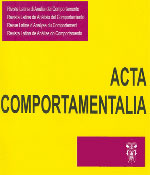Análisis de las interacciones madre-hijo retardado: una perspectiva interconductual
DOI:
https://doi.org/10.32870/ac.v2i1.18226Palabras clave:
retardo, análisis funcional, interacciones madre - hijo, contexto de interacciónResumen
Se caracterizaron, funcional y morfológicamente, las interacciones de 14 diadas madre – hijo retardado en cuatro diferentes contextos: alimentación, aseo personal, trabajo en casa y juego libre, Las categorías utilizadas para analizar y caracterizar dichas interacciones se derivaron de los niveles funcionales propuestos por Ribes y López (1985). Los datos mostraron que la mayoría de las madres no promovieron que sus hijos interactuaran con su ambiente físico y social. Sólo en tres diadas, las madres promovieron en sus hijos tanto la manipulación directa del ambiente físico como la manipulación del ambiente social por medio de gestos y de conductas lingüísticas. Se encontraron diferencias en las conductas que la madre promueve atribuibles al contexto. En los contextos de alimentación y trabajo de casa, las madres no promueven prácticamente ningún tipo de conducta en sus hijos. En los contextos de aseo personal y juego libre la mayoría de las madres promovieron niveles altos de manipulación directa del medio físico. Adicionalmente, sólo en el contexto de juego libre, en tres de las madres predominó promover en sus hijos la manipulación indirecta del media físico, a través del lenguaje.
Descargas
Descargas
Cómo citar
Número
Sección
Licencia

<a rel="license" href="http://creativecommons.org/licenses/by-nc-sa/4.0/"><img alt="Licencia de Creative Commons" style="border-width:0" src="https://i.creativecommons.org/l/by-nc-sa/4.0/88x31.png" /></a><br />Este obra está bajo una <a rel="license" href="http://creativecommons.org/licenses/by-nc-sa/4.0/">licencia de Creative Commons Reconocimiento-NoComercial-CompartirIgual 4.0 Internacional</a>.






